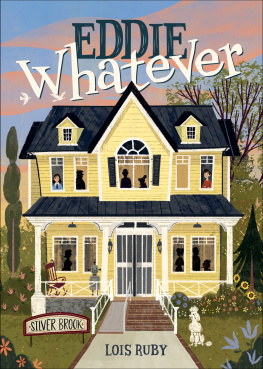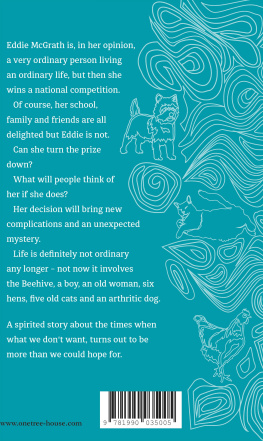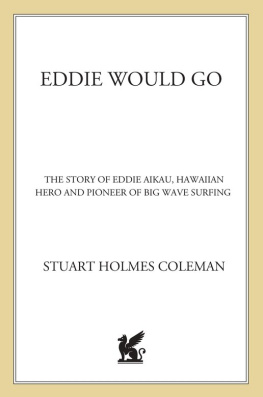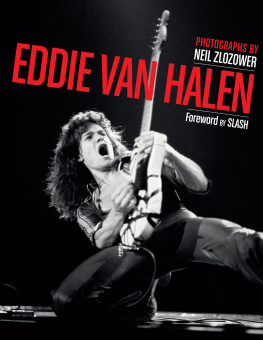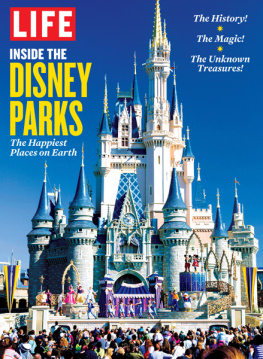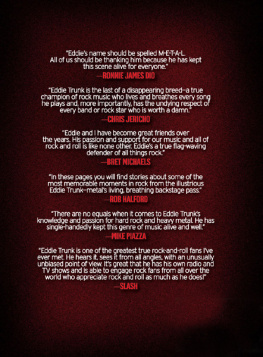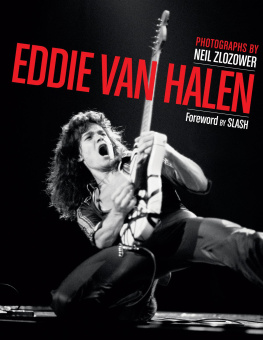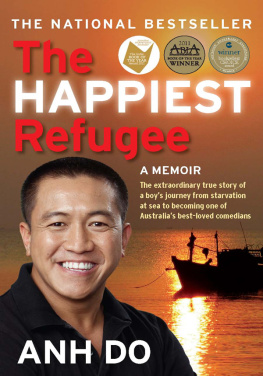Eddie Jaku - The Happiest Man on Earth
Here you can read online Eddie Jaku - The Happiest Man on Earth full text of the book (entire story) in english for free. Download pdf and epub, get meaning, cover and reviews about this ebook. year: 2020, publisher: Pan Macmillan Australia Pty, Limited, genre: Non-fiction. Description of the work, (preface) as well as reviews are available. Best literature library LitArk.com created for fans of good reading and offers a wide selection of genres:
Romance novel
Science fiction
Adventure
Detective
Science
History
Home and family
Prose
Art
Politics
Computer
Non-fiction
Religion
Business
Children
Humor
Choose a favorite category and find really read worthwhile books. Enjoy immersion in the world of imagination, feel the emotions of the characters or learn something new for yourself, make an fascinating discovery.

- Book:The Happiest Man on Earth
- Author:
- Publisher:Pan Macmillan Australia Pty, Limited
- Genre:
- Year:2020
- Rating:4 / 5
- Favourites:Add to favourites
- Your mark:
- 80
- 1
- 2
- 3
- 4
- 5
The Happiest Man on Earth: summary, description and annotation
We offer to read an annotation, description, summary or preface (depends on what the author of the book "The Happiest Man on Earth" wrote himself). If you haven't found the necessary information about the book — write in the comments, we will try to find it.
The Happiest Man on Earth — read online for free the complete book (whole text) full work
Below is the text of the book, divided by pages. System saving the place of the last page read, allows you to conveniently read the book "The Happiest Man on Earth" online for free, without having to search again every time where you left off. Put a bookmark, and you can go to the page where you finished reading at any time.
Font size:
Interval:
Bookmark:
About The Happiest Man on Earth
Life can be beautiful if you make it beautiful. It is up to you.
Eddie Jaku always considered himself a German first, a Jew second. He was proud of his country. But all of that changed in November 1938, when he was beaten, arrested and taken to a concentration camp.
Over the next seven years, Eddie faced unimaginable horrors every day, first in Buchenwald, then in Auschwitz, then on a Nazi death march. He lost family, friends, his country.
Because he survived, Eddie made the vow to smile every day. He pays tribute to those who were lost by telling his story, sharing his wisdom and living his best possible life. He now believes he is the happiest man on earth.
Published as Eddie turns 100, this is a powerful, heartbreaking and ultimately hopeful memoir of how happiness can be found even in the darkest of times.

For future generations
Dont walk behind me, I may not lead.
Dont walk in front of me, I may not follow.
Just walk beside me and be my friend.
Anonymous
Contents
PROLOGUE
My dear new friend.
I have lived for a century, and I know what it is to stare evil in the face. I have seen the very worst in mankind, the horrors of the death camps, the Nazi efforts to exterminate my life, and the lives of all my people.
But I now consider myself the happiest man on Earth.
Through all of my years I have learned this: life can be beautiful if you make it beautiful.
I will tell you my story. It is a sad one in parts, with great darkness and great sorrow. But it is a happy story in the end because happiness is something we can choose. It is up to you.
I will show you how.
CHAPTER ONE
There are many things more precious than money.
I was born in 1920 in a city called Leipzig, in eastern Germany. My name was Abraham Salomon Jakubowicz, but friends called me Adi for short. In English, the name is pronounced Eddie. So please, call me Eddie, my friend.
We were a loving family, a big family. My father, Isidore, had four brothers and three sisters, and my mum, Lina, was one of thirteen children. Imagine the strength of my grandmother, who raised so many children! She lost a son in the First World War, a Jew who sacrificed his life for Germany, as well as her husband, my grandfather, an army chaplain who never returned from the war.
My father was as proud a German citizen as could be, an immigrant from Poland who settled in Germany. He first left Poland as an apprentice in fine mechanical engineering for typewriter manufacturer Remington. Because he spoke good German, he made his way to America working on a German merchant ship.
He excelled in his trade in America, but missed his family and decided to travel back to Europe to visit on another German merchant ship arriving just in time to be caught in the First World War. Because he was travelling on a Polish passport, he was interned by the Germans as an illegal alien. However, the German government recognised that he was a skilled mechanic, and allowed him to leave internment to work in a factory in Leipzig, making heavy weapons for the war effort. In this time he fell in love with my mother, Lina, and with Germany, and stayed after the war. He opened a factory in Leipzig, married my mother, and soon I was born. Two years later, we welcomed my little sister Johanna into the world. We called her Henni for short.
Nothing could shake my fathers patriotism and pride in Germany. We considered ourselves Germans first, Germans second, and then Jewish. Our religion did not seem as important to us as being good citizens of our Leipzig. We practiced our traditions and observed our holidays , but our loyalty and our love were for Germany. I was proud to come from Leipzig, which had for 800 years been a centre for art and culture it had one of the oldest symphony orchestras in the world, and it was a city that inspired Johann Sebastian Bach, Clara Schumann, Felix Mendelssohn, writers, poets and philosophers Goethe, Liebniz and Nietzsche, and many others.
For centuries, Jews had been part of the very fabric of Leipzig society. Since medieval times, the big market day was on Friday, rather than Saturday, to allow Jewish merchants to participate, as work is forbidden for us on Saturday, the Jewish Sabbath. Prominent Jewish citizens and philanthropists contributed to the public good, as well as the Jewish community, overseeing the construction of some of Europes most beautiful synagogues. Harmony was part of life. And it was a very good life for a child. We had the zoological gardens just five minutes walk from my house, famed around the world for its collection and for breeding more lions in captivity than anywhere else in the world. Can you imagine how exciting it was for a small boy? We had huge trade fairs twice a year that my father would take me to the same ones that had made Leipzig one of the most cultured and wealthy cities in Europe. Leipzigs location and importance as a trading city made it a nexus for the spread of new technologies and ideas. Its university, Germanys second oldest, was founded in 1409. The worlds first daily newspaper began publication in Leipzig in 1650. A city of books, of music, of opera. As a boy, I truly believed that I was part of the most enlightened, most cultured, most sophisticated certainly the most educated society in the whole world. How wrong I was.
While I was not personally very religious, we visited synagogue regularly. We kept a kosher kitchen and diet for my mother, who wanted to do things as traditionally as possible to please her mother, my grandmother who lived with us and who was very religious. Each Friday night we would meet for Shabbos (Sabbath) dinner, say our prayers, and eat traditional meals lovingly prepared by my grandmother. She would cook on the huge wood stove that also heated the house. An ingenious system of pipes ran through the home so that spare heat was not wasted, and the smoke was taken safely outside. When we came in frozen from the outside, we would sit on cushions next to that stove to warm up. I had a dog, a little dachshund puppy called Lulu, who would curl up on my lap on cold nights. How I treasured those nights.
My father worked hard to provide for us and we were comfortable, but he was careful to make sure we understood that there was much more to life than material things. Each Friday night, before the Shabbos dinner, Mother would bake three or four loaves of challah , the special, richly delicious ceremonial bread made with eggs and flour that we ate on special occasions. When I was six, I asked him why we baked so many when we were only a family of four, and he explained that he would take the extra loaves to the synagogue to give to Jews in need. He loved his family, and his friends. He was always bringing friends home to share dinner with us, although my mother put her foot down and said he could have no more than five people at a time, as no more could squeeze around our table.
If you are lucky enough to have money and a nice house, you can afford to help those who dont, he would tell me. This is what life is all about. To share your good fortune. My father used to say to me there is more pleasure in giving than in taking, that the important things in life friends, family, kindness are far more precious than money. A man is worth more than his bank account. I thought he was crazy then, but now after all I have seen in this life, I know he was right.
But there was a cloud over our happy family scene. Germany was in trouble. We had lost the last war and the economy was ruined. The victorious Allied powers demanded more money in reparations than Germany could ever pay back, and 68 million people were suffering. There were food and fuel shortages and rampant poverty, which was keenly felt by the very proud German people. Although we were a comfortable middle-class family, it was not possible to find many necessities, even with ready money. My mother would walk many kilometres to market to exchange handbags and clothes shed collected in better times for eggs, milk, butter or bread. For my thirteenth birthday, my father asked me what I wanted, and I asked for six eggs, a loaf of white bread, which was hard to find as Germans prefer rye bread, and a pineapple. I couldnt imagine anything more impressive than six eggs, and I had never seen a pineapple. And somehow, he found one I have no idea how, but that was my father. He would do things that seemed impossible just to put a smile on my face. I was so excited that I ate all six eggs and the whole pineapple at once. Id never had so much rich food. Mum warned me to slow down but did I listen? No!
Next pageFont size:
Interval:
Bookmark:
Similar books «The Happiest Man on Earth»
Look at similar books to The Happiest Man on Earth. We have selected literature similar in name and meaning in the hope of providing readers with more options to find new, interesting, not yet read works.
Discussion, reviews of the book The Happiest Man on Earth and just readers' own opinions. Leave your comments, write what you think about the work, its meaning or the main characters. Specify what exactly you liked and what you didn't like, and why you think so.

